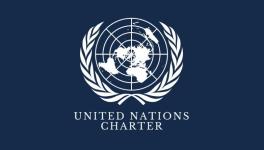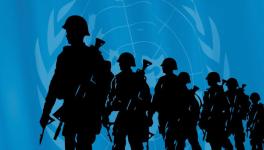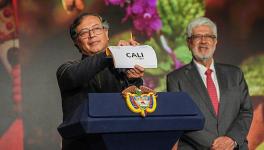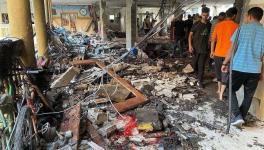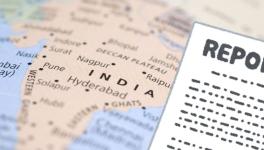‘F in Ethics’: UN Sec. General Blasts Richer Countries on COVID-19 Vaccine Distribution
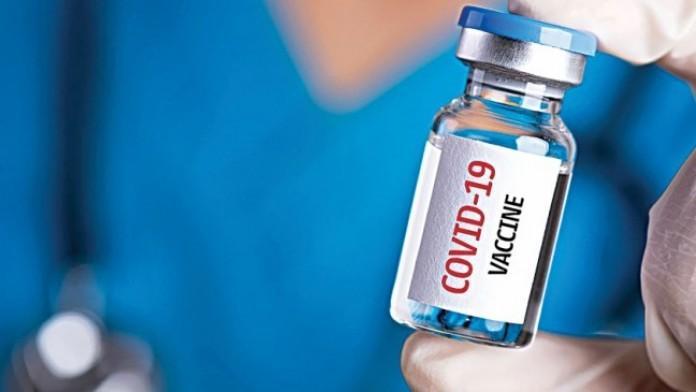
Representational Image. Image Courtesy: The Daily Star
United Nations Secretary-General António Guterres told the United Nations General Assembly on Tuesday that “the tragedy of a lack of political will, selfishness and mistrust” had undone the scientific victory achieved by the world developing COVID-19 vaccines in a relatively short period of time. He said the world had got an ‘F in ethics’ with richer countries not leaving enough vaccines for others.
“The picture we have seen from some parts of the world of COVID-19 vaccines … in the garbage. Expired and unused. On the one hand, we see the vaccines developed in record time — a victory of science and human ingenuity,” he said.
The Secretary General said that while most of the well-off countries had already vaccinated their people, over 90% of people from Africa were un-vaccinated.
“This is a moral indictment of the state of our world. It is an obscenity. We passed the science test. But we are getting an F in Ethics,” the Secretary-General said.
“I am here to sound the alarm: The world must wake up. We are on the edge of an abyss — and moving in the wrong direction. Our world has never been more threatened. Or more divided,” he added, mentioning that while COVID-19 had laid bare “glaring inequalities”, the climate crisis was “pummelling the planet. A surge of mistrust and misinformation is polarising people and paralysing societies. At the same time human rights are under fire and science.”
He mentioned the need for an urgent vaccination strategy which would see the doubling of vaccine production which would result in about 70% of the world’s population being vaccinated in the first half of 2022.
“Economic lifelines for the most vulnerable are coming too little and too late — if they come at all. Solidarity is missing in action — just when we need it most,” Guterres was quoted saying, mentioning “a breakdown in trust that is leading to a breakdown in values.”
His statement came as world leaders, aid groups and global health organisations have been growing increasingly vocal about the slow pace of global vaccinations and the inequity of access to shots between residents of wealthier and poorer nations.
“Global health security until now has failed, to the tune of 4.5 million lives, and counting,” Guterres told the summit, referring to the confirmed global death toll from COVID-19.
“We have effective vaccines against COVID-19. We can end the pandemic. And that is why I have been appealing for a global vaccination plan and I hope this summit is a step in that direction,” he said.
The American response has come under criticism for being too modest, particularly as the administration advocates for providing booster shots to tens of millions of Americans before vulnerable people in poorer nations have received even a first dose.
“We have observed failures of multilateralism to respond in an equitable, coordinated way to the most acute moments. The existing gaps between nations with regard to the vaccination process are unheard of,” Colombian President Iván Duque said Tuesday at the United Nations.
More than 5.9 billion COVID-19 doses have been administered globally over the past year, representing about 43% of the global population. But there are vast disparities in distribution, with many lower-income nations struggling to vaccinate even the most vulnerable share of their populations, and some yet to exceed two to three per cent vaccination rates.
Chilean President Sebastian Piñera said the “triumph” of speedy vaccine development was offset by political “failure” that produced inequitable distribution. “In science, cooperation prevailed; in politics, individualism. In science, shared information reigned; in politics, reserve. In science, teamwork predominated; in politics, isolated effort,” Piñera said.
The World Health Organization said only 15% of promised donations of vaccines — from rich countries that have access to large quantities of them — have been delivered. The UN health agency has said it wants countries to fulfill their dose-sharing pledges “immediately” and make shots available for programs that benefit poor countries and Africa in particular.
COVAX, the UN-backed program to ship vaccines to all countries, has struggled with production issues, supply shortages and a near-cornering of the market for vaccines by wealthy nations.
The WHO has urged companies that produce vaccines to prioritize COVAX and make public their supply schedules. It also has appealed to wealthy countries to avoid broad roll outs of booster shots so doses can be made available to health care workers and vulnerable people in the developing world. Such calls have largely gone ignored.
COVAX has missed nearly all of its vaccine-sharing targets. Its managers also have lowered their ambitions to ship vaccines by the end of this year, from an original target of some two billion doses worldwide to hopes for 1.4 billion now. Even that mark could be missed.
As of Tuesday, COVAX had shipped more than 296 million doses to 141 countries.
With PTI inputs
Get the latest reports & analysis with people's perspective on Protests, movements & deep analytical videos, discussions of the current affairs in your Telegram app. Subscribe to NewsClick's Telegram channel & get Real-Time updates on stories, as they get published on our website.










